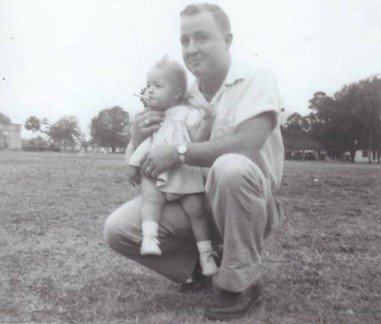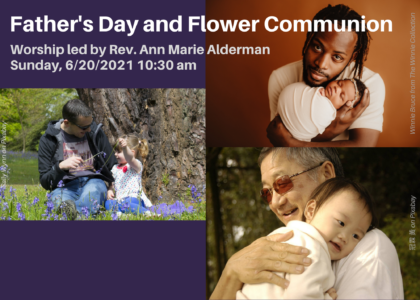I have my “father” story to share. I’ve brought a picture of him and me (below), from when I was maybe 2.
My wish for today is that you will share yours. Like the flowers we bring today, and the pictures of our fathers, or the memories in our hearts, we come with what we have and we will leave with what we have picked up, made our own.

Maybe, as we share and hear some common themes—others that offer contrast, all that provides more richness—we will end with a bouquet of flowers and fathers, as we share this morning together.
Jennie reminded us where the flower communion originated and why we repeat it year after year.
Father’s Day is an annual holiday as well, meant to call us to remember, to celebrate, and to thank our fathers, or any who have played the role of dad for us. Our culture tells us that fathers are our guides, our providers, our models for responsibility, of strength and courage. Our culture has also told us that fathers can be repressive, authoritarian, abusive, exploitative, not interested in relationship.
But things are changing, have been changing: New generations of sons and male-identified folks who have eagerly recreated “fatherhood,” learning to nurture, to be more engaged with their children.
Many dads take very seriously the nearly indelible imprint they make upon their children.
The term “father” implies a relationship with a “child” of some sort. When capitalized, it is also the name of an archetype representing much more than one or more of our particular parents. The Father is the “guy in charge.” And even when that isn’t what we may have experienced, most of us carry a powerful set of memories, stories, images regarding fathers, particularly our own fathers, that has deeply molded and influenced us.
My dad died when I was seventeen. His sudden, unexpected death when I was about to enter adulthood was a big deal.
There were many years of my own theological struggle that mainly involved a full-out rejection of the Father God I had grown up with. That struggle eventually brought me into Unitarian Universalism.
It is ironic that it has also been Unitarian Universalism that has allowed me to find a new way to appreciate not only my dad, but men in general.
Society used to say that the father was the “guy in charge.” But that is not who my dad was.
In my family, my dad and my grandfathers were the nurturers. The “person in charge” (when the door to the outside world was shut) was my mother, along with my grandmothers. My dad and the other men in my family were the sentimental, emotional, playful people.
I miss him.
Each of us has both gifts and wounds from those who fathered us. Parents make mistakes. They disappoint their children. They set questionable examples sometimes. They die. But without the modeling of being human, we wouldn’t be able to grow up.
I know that some wounds inflicted by fathers are deeper for some than for others. Some people’s hearts have been broken by their fathers’ neglect or abuse, or by the lack of good fathering in their lives.
When Father’s Day comes along, while it may be a joyful day for some, it can also bring up the pain others carry from the relationships they had with their fathers. It can also trigger grief and sadness for those who have lost their fathers or whose fathers’ lives have been diminished from illness or old age.
Let’s remember that; not all dads are good people deserving of honor.
Jane Myers Drew, a psychologist whose father died when she was only a toddler, grapples with the question of how to recover from what she calls “fathering wounds.” She offers some guidance in her book, Where Were You When I Needed You, Dad? She says that first of all, we must increase our awareness of our father’s impact on us: We must define what we missed from our dad when we were young, and what we received from him. Then, we must get in touch with any hurt and anger we may be holding onto regarding our dad, and make room for expressing our feelings, mourning, and letting go of our pain.
When we have honored our feelings, we are able to look again at our father, seeing him as a human being in his own right, and cultivating a deeper understanding of his situation. This will help us to say goodbye to the dad of our youth, and to release any expectations we have that can no longer be fulfilled. Then, we turn to healing the child within, reconnecting with that young part of ourselves who wanted to be nurtured and treasured by a tender father. We can try to become our own good father, finding ways to fill in for the experiences we missed with our dad.
Fathering ourselves will be different for each of us. Each of us had unique childhood experiences, different gifts, and wounds that we received. For some it may not be simple or easy to undo the damage of childhood. But even if we didn’t receive all the fathering we needed from our biological fathers, or other childhood caregivers, we can receive fathering from others even as adults.
All of us, as adults, can learn to parent ourselves and each other, to share the gifts we received from our fathers, and to heal from the wounds of our childhoods. We can adopt father figures to help us learn what we didn’t learn from our own parents.
Father figures are those who believe in us, who treat us like we’re special. It might be as simple as a neighbor who teaches us how to do something we wished our dad had taught us. It might be as simple as identifying a potential father figure in the congregation who would agree to listen to us.
Part of growing up is realizing that our fathers are human beings with gifts and failings. Part of growing up is letting go of needing our fathers to be better than they were. This is easier to do if we realize that we can offer and receive fathering from others. When we can do this, we are also better able to honor the gifts and forgive the wounds we have received from our fathers.
What might you have wished for in a father? What might you have that you continue to hold dear? What might you add to the bouquet of dads?
My dad gave me an appreciation of the value of each and every person, and of humor.
If you appreciated this reflection, please text to give or visit our Give Now page to support the UUCSH Share the Plate efforts to assist those in need.

